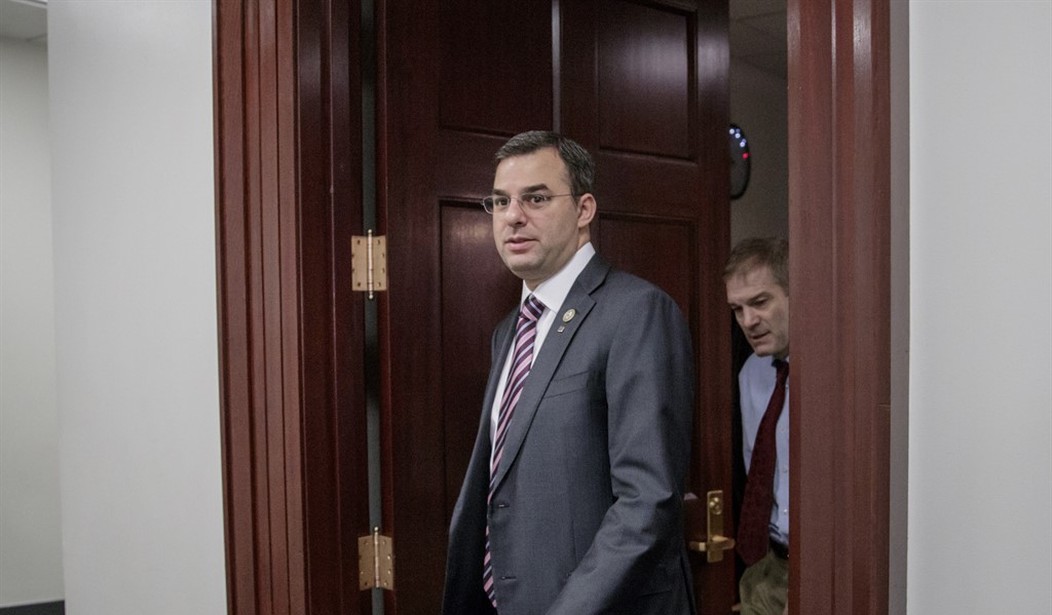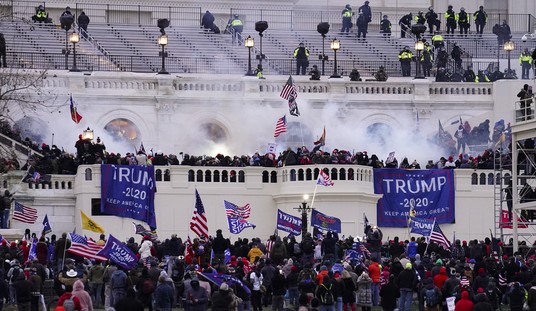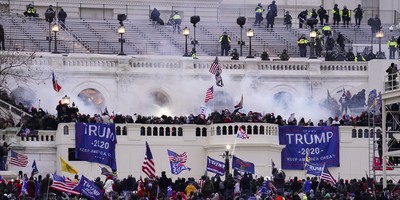Congressman Justin Amash created a stir over the weekend by becoming the first Republican member to express a belief that President Trump should be impeached. Reaction to the libertarian-minded Michigan representative was swift and intense, including an array of takes from various political commentators, a predictably harsh response from the Republican National Committee and -- of course -- an inevitable Twitter salvo from the president himself:
....he would see that it was nevertheless strong on NO COLLUSION and, ultimately, NO OBSTRUCTION...Anyway, how do you Obstruct when there is no crime and, in fact, the crimes were committed by the other side? Justin is a loser who sadly plays right into our opponents hands!
— Donald J. Trump (@realDonaldTrump) May 19, 2019
Amash's stance is unlikely to shift the political calculus very much in Washington. Democrats' base still wants impeachment, but party leaders are perfectly capable of reading polls, and have therefore repeatedly downplayed the likelihood of pursuing that unpopular course of action. The addition of a single Trump-hostile GOP back-bencher to the impeachment brigade won't change those dynamics (especially with other prominent Trump-skeptical conservatives rejecting Amash's view), even if it delivers a handy talking point to the president's critics. Setting aside the issue of whether Amash's statement will have any practical impact on the matter, let's consider it on the merits, point by point:
Here are my principal conclusions:
— Justin Amash (@justinamash) May 18, 2019
1. Attorney General Barr has deliberately misrepresented Mueller’s report.
2. President Trump has engaged in impeachable conduct.
3. Partisanship has eroded our system of checks and balances.
4. Few members of Congress have read the report.
Recommended
(1) This is a serious accusation, with which I disagree entirely. William Barr's summary memo to Congress regarding the Mueller report's 'bottom line' legal findings and outcomes was absolutely and entirely accurate. He correctly conveyed: That Mueller found no conspiracy or coordination between the Trump campaign (or any Americans, for that matter) and the Russian government's 2016 election meddling, and that the Special Counsel laid out evidence and analysis on both sides of the obstruction of justice question, ultimately declining to make any charging recommendation in either direction. Barr relayed all of this information, even directly quoting the portion of the report that specifically said the lack of recommended charges was not an "exoneration." After fielding Mueller's punt, Barr and DAG Rod Rosenstein applied their own legal judgment, reaching the totally reasonable and defensible, if debatable, conclusion that no prosecution was warranted.
More important than any of that, however, is the simple fact that Barr released Mueller's extremely lightly-redacted work to the American people. If people choose to that believe Barr's top-line summaries didn't sufficiently convey the gravity of the evidence against Trump to the public, they're entitled to that opinion -- but it's an opinion have only been able to formulate thanks to Barr going above and beyond his legal requirements by publishing the roughly 450-page document for all to see. As I view it, Barr's analysis was spot on. His supposed "lying" to Congress is nonsense. It's conceivable that he's lying about the nature of several conversations he had with Robert Mueller (for instance, on Mueller's apparent insistence that his decision not to recommend charges wasn't rooted on DOJ guidance about indicting a sitting president), but I doubt it. But if he did lie, Mueller can tell Congress as much if and when he testifies, which Barr notably hasn't opposed. Amash asserts that Barr's alleged misleading conduct is "significant" but subtle, relying on people failing to notice "sleight of hand" and "logical fallacies." He provides no examples. I strongly suspect Barr could handle any of his objections professionally and convincingly.
(2) This is a purely subjective and prudential judgment to be made exclusively by members of Congress. The standard for impeachment is quite vague and effectively amounts to a political decision to be weighed by elected members of the House. Having read the report, Amash writes that the impeachment threshold "simply requires a finding that an official has engaged in careless, abusive, corrupt, or otherwise dishonorable conduct." In his view, Trump's actions meet this definition. He claims that anyone who was not President of the United States would "undoubtedly" be indicted under similar circumstances -- a view shared by hundreds of former prosecutors. But there are also many powerful and persuasive dissenting voices on this question, and the legal issues aren't nearly as clear-cut as Amash suggests. Despite Trump's impulses and outbursts, the investigation never ended up getting obstructed -- and the underlying crime (conspiracy) and grave misconduct (coordination) it was seeking to unearth never materialized. I think it's a gross simplification to cast this as a legal layup the way Amash does, although I won't accuse him of deliberately misleading his constituents on this point.
Whether a president's actions are impeachable is a judgment call that's left totally to the discretion of people who hold Amash's elected office. He's reached his own determination on the question. Despite being deeply troubled by a number of episodes documented in the Special Counsel's report (I do not remotely endorse the talking points that Trump did 'nothing wrong,' or that Mueller definitively found 'no obstruction'), I take a different view -- a view that's informed by Amash's well-taken point that impeachment is an option that ought to be exercised only under extreme circumstances. Given the fundamental 'no collusion' finding, and considering that there's an election next fall, I believe that it would be wrong to move to dislodge the duly-elected president from office based on the evidence we have.
(3) There is no question in my mind that this is true. Partisan tribalism has overtaken nearly all other considerations among a great many federal lawmakers in both parties. Democrats almost always defend Democrats, and Republicans almost always defend Republicans. Protecting one's party or ideological allies often seems more important than protecting one's institution. There's a reason why exceptions to this general and growing reality are so often newsworthy.
(4) As a member of Congress, Amash is likely better equipped to make this statement than most people, but it seems both likely and unsurprising. Congressmen and Senators routinely vote on measures they haven't read, so it would follow that they wouldn't bother actually reading a thick stack of papers produced by Robert Mueller when readily-available summaries and partisan analyses are ubiquitous. To his credit, Amash actually reads the legislation he votes on, and publicly posts a constitutional explanation for every vote he casts. In sum, on this issue, I profoundly disagree with the Congressman's commentary about the Attorney General, understand but depart from his arguments on impeachment, and agree with his broader critique of the legislative branch's myriad abdications and frequent laziness. I'll leave you with this:
BARR to @FoxNews Pelosi's charge he lied under oath: "I think it's a laughable charge and I think it's largely being made to try to discredit me partly because they may be concerned about the outcome of a review of what happened during the election"
— Saagar Enjeti (@esaagar) May 17, 2019























Join the conversation as a VIP Member